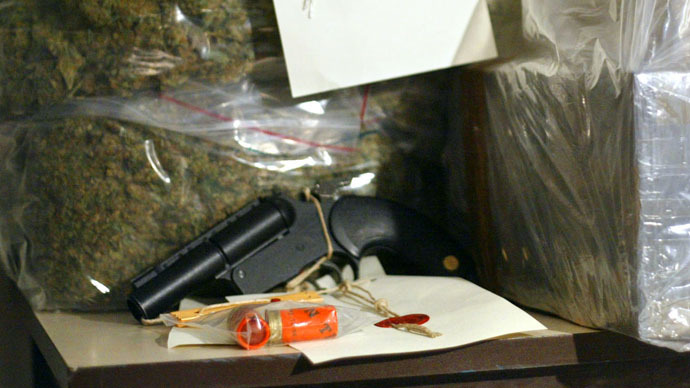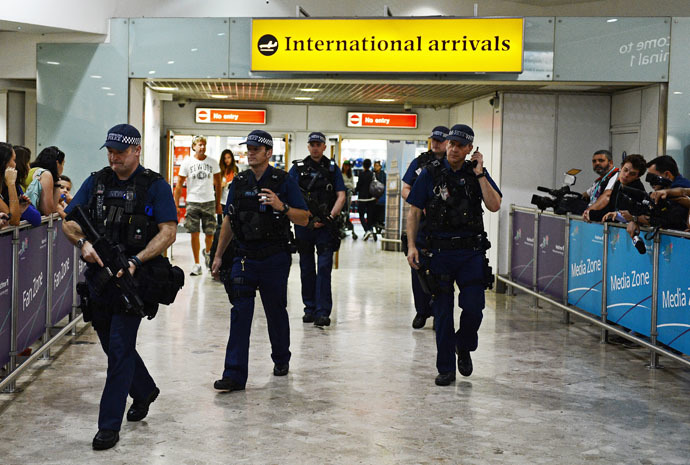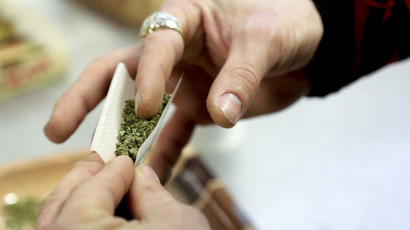‘Early Christmas present’: Drugs and guns seized by Border Force vulnerable to criminal gangs

Illegal drugs, firearms, alcohol and tobacco seized by UK authorities could be stolen by criminal gangs because of “unacceptably” lax Border Force policies, research published on Thursday reveals.
The report highlights troubling gaps in border security that create opportunities for illicit drugs, weapons and contraband to be stolen by temporary staff, criminal gangs, or black-market moguls.
John Vine, Britain’s independent Chief Inspector of Borders and Immigration, warned there are large “discrepancies” between the amount of contraband seized at Britain’s borders and that which finds its way to customs’ warehouses.
The Chief Inspector’s report uncovered evidence there were troubling discrepancies in 1,478 out of 1,723 shipments of goods dispatched by border and customs officials and the National Crime Agency (NCA) to high security storehouses.
Security seals on cargo were commonly tampered with, and paperwork failed to match the seized goods. Shoddy paperwork and poor oversight of shipments meant staff mislaid swathes of seized contraband, including an imitation gun no one could account for.
The planned incineration of some of these items was delayed by as much as 12 years, Vine's research reveals.
Serious lapses in security were also apparent when hired contractors transferred illegal goods, particularly Class A drugs, to be destroyed. The street value of the narcotics was estimated to be worth millions of pounds. The lax security when transferring contraband made it highly vulnerable to criminal gangs, the report warned.

Vine, a scathing immigration watchdog whose critical reports have stoked the ire of Home Secretary Theresa May, concluded certain procedures highlighted in his report were inadequate and “unacceptable in such a high-risk environment.”
Although Vine sent his research to the Home Office in September, the report was shelved until Thursday.
A spokesperson for the Home Office told RT on Friday it continually assesses the risks associated with warehouses set aside for storing seized goods.
“Border Force officers are on the front line in protecting the country and play an essential role in tackling the organized crime gangs and smugglers who attempt to bring drugs and illicit goods into the UK,” the spokesperson said.
“Robust procedures are in place to ensure goods do not fall into the hands of criminal gangs and these remain secure storage facilities,” the spokesperson added.
But Shadow Immigration Minister David Hanson remains unconvinced by the Home Office’s assurances.
He told the Daily Mail newspaper the Home Secretary must intervene in what appears to be the theft of narcotics, weapons and contraband following government operations to seize such goods.
“The gaps in security at our customs warehouses look like an early Christmas present for thieves and smugglers,” he added.
Border Force’s Seized Goods Warehouses Secure, but Risk of Theft Exists http://t.co/kBp9mH5ijA
— John Vine (@ICIBIVine) December 11, 2014
In October, Office of National Statistics (ONS) figures revealed Britons’ spending on illegal drugs adds as much £6.7 billion ($10.8 billion) per year to the UK economy.
Until recently, financial data on revenue generated by illegal drugs wasn't factored into Britain’s official measure of gross domestic product (GDP). But an ONS report published in May marked the first time such illicit industries were included in official GDP estimates.
If black market economic activity is factored in, experts suggest the nation’s economy has experienced more growth in recent years than was formerly believed.
As a result, the UK’s slow recovery from the depths of the recession that threatened to derail the economy is thought to have begun earlier than was initially estimated.














